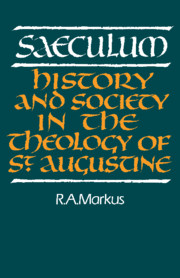Book contents
- Frontmatter
- Contents
- Introduction to the revised edition
- Preface
- Abbreviations
- 1 History: sacred and secular
- 2 Tempora Christiana: Augustine's historical experience
- 3 Civitas terrena: the secularisation of Roman history
- 4 Ordinata est res publica: the foundations of political authority
- 5 Afer scribens Afris: the Church in Augustine and the African tradition
- 6 Coge intrare: the Church and political power
- 7 Civitas peregrina: signposts
- Appendixes
- Bibliographical note
- List of works referred to
- Index
4 - Ordinata est res publica: the foundations of political authority
Published online by Cambridge University Press: 26 October 2009
- Frontmatter
- Contents
- Introduction to the revised edition
- Preface
- Abbreviations
- 1 History: sacred and secular
- 2 Tempora Christiana: Augustine's historical experience
- 3 Civitas terrena: the secularisation of Roman history
- 4 Ordinata est res publica: the foundations of political authority
- 5 Afer scribens Afris: the Church in Augustine and the African tradition
- 6 Coge intrare: the Church and political power
- 7 Civitas peregrina: signposts
- Appendixes
- Bibliographical note
- List of works referred to
- Index
Summary
Augustine's ideas about the Roman Empire were the outcome of two debates. One was the long-sustained debate among Christians since the beginning about how to look upon the Empire in relation to the divine plan of salvation. The other was Augustine's debate with himself, the slow realisation of what was implied by his theology, the growth of reservations about contemporary enthusiasms for the victory of Christianity under the Theodosian establishment, all culminating in his final rejection of the attitudes which nourished this enthusiasm. The final spur to the re-thinking involved was given by the perplexity, both within and beyond the Christian community, provoked by the Sack of Rome in 410. Thus at every stage of their development, Augustine's ideas in this sphere unfold against a varied background of contemporary reflection.
It is otherwise when we consider his views on what might be called the fundamental questions of political theory: questions about human society and its institutions in general, and especially in relation to the ultimate purposes of human life; questions about political authority and obedience, about law and social order. The very concept of a ‘state’ is one in which we credit Augustine with an interest by extrapolating from the direction of his remarks about Rome; but such an extrapolation, though permissible as a logical inference, must be recognised to be a historical anachronism if read back into Augustine. On such topics a little ingenuity and considerable industry can provide a fair harvest of remarks scattered through the works of Christian Fathers and of secular literati.
- Type
- Chapter
- Information
- SaeculumHistory and Society in the Theology of St Augustine, pp. 72 - 104Publisher: Cambridge University PressPrint publication year: 1989



